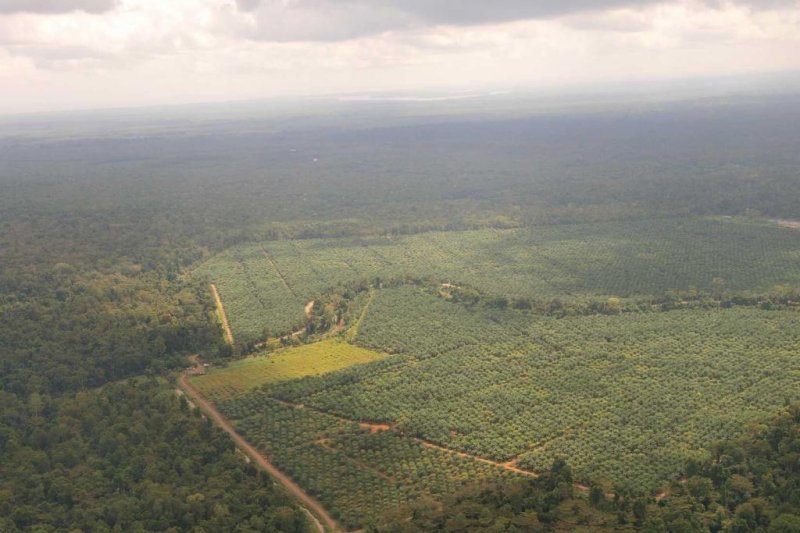An aerial photos shows the first 38 acres of palm oil plantation that will be turned back into rainforest on the island of Borneo. Photo by Robert Risch
March 22 (UPI) -- Across the island of Borneo, conservationists are preparing to rewild palm oil plantations. The project will see agricultural acreage turned back into near-natural rainforest.
The list of species threatened by deforestation as a result of palm oil production in Malaysia and Indonesia includes the orangutan, Sumatran elephant, Bornean pygmy elephant, Sumatran rhino and Sumatran tiger.
Conservationists and ecologists presented the details of the reforestation project this week in Malaysia at the Heart of Borneo conference. The effort is being organized by the Rhino and Forest Fund, or RFF.
RFF is German-based organization that is supported by the Leibniz Institute for Zoo and Wildlife Research and dedicated to protecting the Sabah rhino, as well as "the remaining lowland rainforest in Malaysia and its unique flora and fauna."
The reforestation project is designed to meet the Aichi Biodiversity Targets set by the Convention on Biological Diversity. The project will also meet goals set at the United Nations Climate Change Actions Summit Climate Change Actions Summit held in New York in 2014.
In its current form, the project will reforest 1.3 million square miles of rainforest, as well as re-naturalize degraded land by 2030.
The end goal is large, but project organizers plan to start modestly and learn as they go.
"There is a lack of evidence-based experience in practice," conservationists acknowledged in a news release. "With this pilot scheme, the Rhino and Forest Fund would like to close this knowledge gap."
To begin, project leaders plan to turn 15.5 hectares, or 38 acres, of palm oil plantations back into rainforest.
"The signing of a purchase agreement at the current Heart of Borneo conference in Kota Kinabalu, Malaysia, marks a breakthrough in the creation of a significant wildlife corridor," said Robert Risch, a RFF board member and scientist at the Leibniz Institute for Zoo and Wildlife Research. "In order to prevent mass extinction of species, isolated forest areas must be reconnected as soon as possible."
The initial project will provide conservationists a chance to develop best practices as they scale their reforestation efforts.
"The challenge is to investigate the optimal transformation of oil palm plantations and their degraded soils into near-natural rainforests," said Swiss researcher Philippe Saner, an environmental scientist and founding member of the RFF. "Knowledge gained from this enables us to make statements about future optimal surface reconstruction."
Scientists are keen to find out how long it takes for biodiversity to return to palm oil plantations once they have been rewilded.















